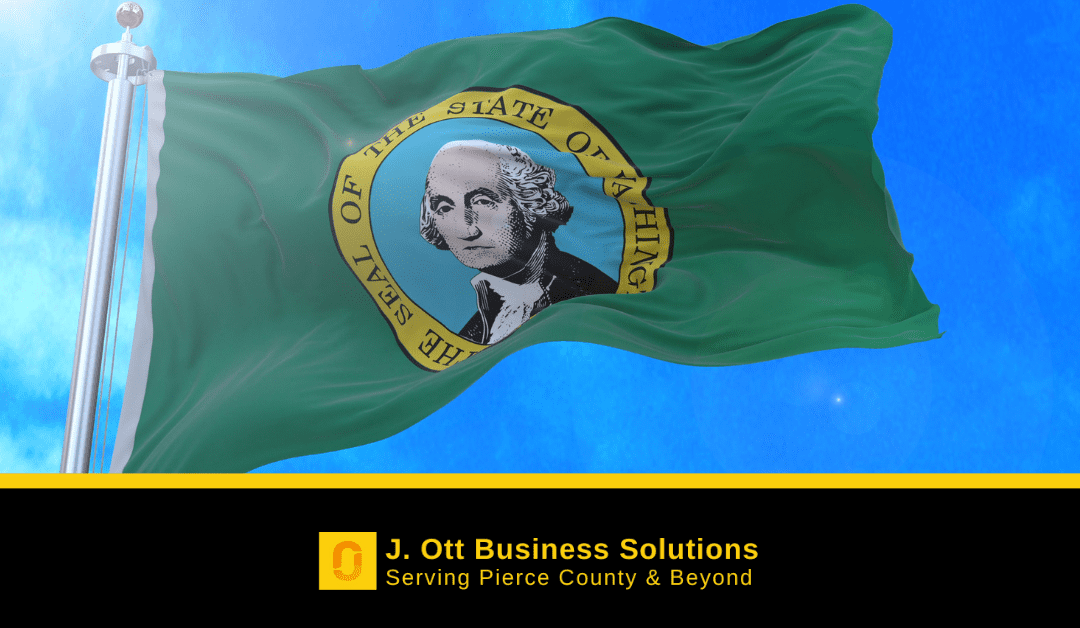What You’ll Learn in This Post:
Washington State is unique in its approach to business taxes. While there’s no corporate or personal income tax, businesses still have several tax obligations to stay on top of. In this post, we’ll break down the main types of taxes you may encounter and what small business owners in Tacoma and the South Sound need to know.
Washington State’s Business Tax Structure
In Washington, businesses aren’t required to pay corporate or personal income tax. Instead, most companies are subject to:
- Business and Occupation (B&O) Tax
- Retail Sales and Use Tax
- Personal Property Tax
Some cities also impose their own local B&O tax, which is separate from the state tax and collected at the city level.
For more details on Washington State’s business tax structure, visit the Washington State Department of Revenue’s official guide.
Business and Occupation (B&O) Tax – State Level
Nearly all businesses in Washington State—including corporations, LLCs, partnerships, and sole proprietors, both nonprofit and for-profit—pay the B&O tax.
Here’s what to know:
It’s calculated on gross income from business activities, not net profit.
Most service-based businesses fall under the “Service and Other Activities” classification with a 1.5% tax rate on gross receipts.
Because it’s based on gross income, even businesses with slim profit margins or those operating at a loss may still owe B&O tax.
Retail Sales and Use Tax
Most sales of tangible personal property to consumers are subject to retail sales tax.
This includes not only products but also certain services—such as charges by title insurance, escrow, or credit bureau companies.
Here’s how it works:
Sellers must collect retail sales tax at the point of sale.
If they don’t, the buyer owes use tax when the goods are first used in Washington.
Common examples where use tax may apply:
- Common examples where use tax may apply:
- Computer equipment purchased from out-of-state vendors
- Business property acquired during a business transfer
- Promotional items like calendars, hats, or branded merchandise
- Magazine subscriptions and artwork
Use tax is calculated at the same rate as sales tax, but it’s based on where the buyer uses the item in Washington, not where it was purchased.
Personal Property Tax
Most people know real property (like land and buildings) is subject to property tax, but personal property used in a business is also taxable. This includes equipment, furniture, and supplies.
Key points for business owners:
- The same tax rate applies to both real and personal property.
- Businesses must file a personal property tax listing form by April 30 each year.
- County assessors use this form to value property for taxes due the following year.
If you haven’t received a listing form by January or have questions, contact your local county assessor’s office.
Local B&O Tax
Some Washington cities, including Tacoma, have their own local B&O tax. This is separate from the state B&O tax and requires additional reporting.
If you operate in a city with local B&O tax requirements, be sure to check the city’s website for filing instructions and deadlines.
Staying Compliant Without the Stress
Managing state and local tax obligations can feel overwhelming, especially when deadlines, forms, and rules overlap. That’s where professional bookkeeping and payroll support can make a real difference.
At J. Ott Business Solutions, we help small business owners in Tacoma and the South Sound stay organized and on track with:
- B&O tax reporting support
- Sales and use tax guidance
- Personal property tax reminders and recordkeeping
- Payroll and bookkeeping services to keep everything running smoothly year-round
The Bottom Line
Washington’s business tax structure is unique, but with accurate records and the right support, you can stay compliant and avoid surprises.
Contact J. Ott Business Solutions today to schedule a consultation and learn how we can help your business stay organized, accurate, and ready for growth.

